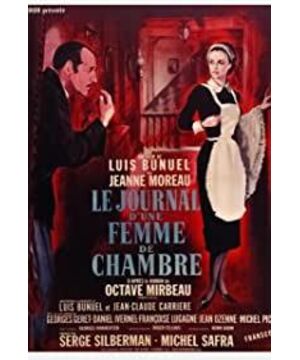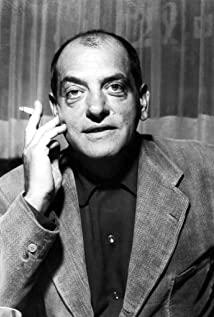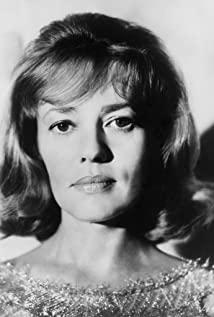If you don't understand the social and political situation in France in the 1920s and 1930s, then there may be too much confusion about the plot arrangement in the movie "The Handmaid's Diary".
Because, the main part of the film revolves around a maid named Christina, who tells the story of her service to the Montais, a middle-class family in the French countryside.
She was Zhou Xuan between four men at the same time, attracted the attention of these men, and eventually became the wife of one of the men, a middle-class noblewoman served by other maids.
At the same time, however, one of the men, Joseph, the Montais' housekeeper, regularly organized "anti-Semitic" campaigns and poured out his dissatisfaction with the Jews and the republican government among the servant circles in the countryside.
Even at the end of the film, the demonstrations of the "anti-Semitic movement", along with thunder and lightning, become a certain metaphor for danger.
For the story level of "The Handmaid's Diary", we can find the basis in Octavius Mirbeau's novel of the same name, but for the political and social environment in the film, we need to find clues in the career of director Buñuel.
After graduating from the university in Madrid, Buñuel spent most of his time in French literary circles from the late twenties to the mid-thirties. During this period, he experienced a social thought that was almost unheard of in Spain before - the "anti-Semitic movement".
Although as a representative of surrealism, Buñuel has always been against the mainstream morality of society, but the "anti-Semitic movement" made him feel great confusion and anger.
So when he created the film adaptation of "The Handmaid's Diary", he did not follow Mirbeau's original novel and set the background of the story in the so-called "Belle Epoque" (the end of the nineteenth century to the First World War).
Instead, the whole story is moved to the 1920s, and a story about lust and women's choice is related to the French history of this period. It is obvious that Buñuel is not only interested in the lust in the novel "The Handmaid's Diary". gimmick.
In "The Handmaid's Diary," the maid Christina, played by Jeanne Moreau, looks like an immoral stunner.
At least in the first half of the film, for Mr. Montais, the male owner of the Monterey family, she would walk around the room in tall leather boots at night, showing her sexy calves, to satisfy his abnormal foot fetish.
As for Mr. Monterey's son-in-law, a middle-aged man whose wife is reluctant to satisfy his sexual desires, and who has a sexual impulse whenever he sees a woman, although Christina is reluctant to let him do it too early, she often teases him.
As for the housekeeper Joseph, Christina is even more entangled with him in the second half of the film. But in the end, she married the retired lieutenant next door and became a member of the middle class as she wished.
She did use her beauty and skills to rush from the metropolis of Paris to the countryside, wandering in the lustful eyes of four men, and embarked on the fastest way for a working girl to cross the class gap.
However, this "inspirational story", which is covered with cold material desires, has a different meaning in the middle of the film.
A little girl named Claire was brutally raped and murdered in the woods not long ago. Christina originally planned to leave this place of right and wrong after the death of Mr. Monterey, but after hearing the news, she decided to return to Monterey. The Tai family intends to find the real culprit and bring him to justice.
This seemingly abrupt, and even inconsistent with the character setting makes us rethink Christina's true character.
When we determined that she was just a woman of the dust for the sake of rice, she instantly showed the warm side of human nature.
This is a recurring theme in Buñuel's films: contradictory human nature. He always sets some seemingly weak characters in the film, but these extremely prejudiced or extremely religious people, after encountering unexpected events, begin to make decisions that are completely contrary to their original characters.
For example, in "Girl", the racially prejudiced white man who molested the girl finally helped the black man get on the boat; in "Nazarin", the priest, who had a devout faith, was in an unfair prison. After the disaster, the goodness of human nature also began to shake.
Buñuel will always bombard the stable normality with instant changes, find cracks in the so-called permanence, belief, and oath of human nature, and then continue to tear down the cracks until he touches the most chaotic human nature.
But the surrealist probably didn't want to make fissure a warm cliché. Christina did secretly make love for the raped and murdered Claire and the housekeeper Joseph, until the fact that Joseph was the murderer was confirmed in the bedtime romance.
After learning the truth, she did not expect a fair investigation, but chose the most direct punishment method - fabricating false evidence, thus sending Joseph directly to the cell.
But has the so-called justice triumphed? Buñuel still can't make the decision, and at the end of the film, Joseph, as he had promised to Christina, opened a bar in Paris and not only lived the life of a secure city businessman, but also became a supporter." anti-Semitic movement".
The nationalists used paranoia and tyranny to push France into the bottomless abyss, and this result has various micro-factors piled up in Buñuel's film "The Handmaid's Diary".
The old Mr. Monterey's unusual foot fetish; the selfishness and ruthlessness of the old Mr. Daughter's husband's normal sexual desires; Na, he did not hesitate to divorce his wife of twelve years.
The middle class of these French villages will only exhaust everything in their own desires, and have no regard for moral sense, and always uphold honor and belief.
What about the servants of the lower class? When Monterey's son-in-law failed to pursue Christina, in order to vent his sexual desires, he turned his attention to the squat and ugly maid, and the poor maid not only did not refuse, but also burst into tears after hearing the request of the grown-up Bewildered.
For her, this is not a humiliation, it is clearly a favor!
It is this corruption of moral sense that immerses the whole society in selfishness and paranoia. Buñuel disclosed the dark society he experienced in his youth in a common and thoughtful way, and the result was the same as the masterpiece "Velitiana" that reflected on religion. Desperate, but can only stand by and watch.
Although in his interviews with Buñuel, he often denies that the images appearing in his images have some kind of definite signifier, for "The Handmaid's Diary", the scene after the little girl was raped and killed, It was indeed related to the "anti-Semitic movement" in France at that time.
The animalistic wild boar's attack on the weak rabbit is not only a metaphor for Joseph's rape and murder of a little girl, but perhaps a grander implication: the whole of Europe discriminated and brutalized Jews almost madly at that time.
View more about Diary of a Chambermaid reviews











